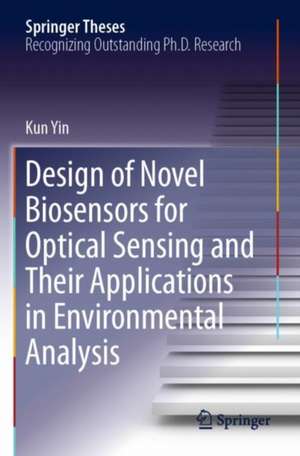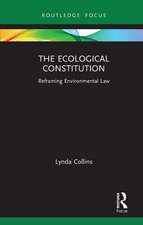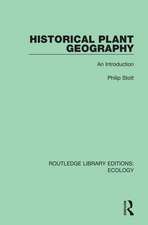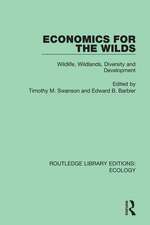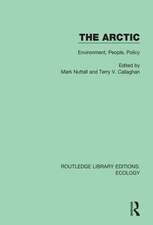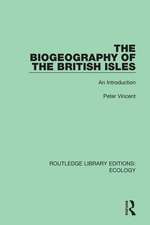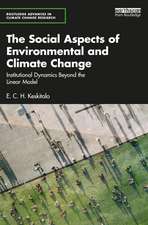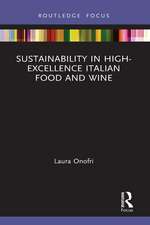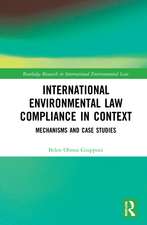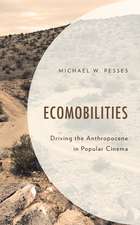Design of Novel Biosensors for Optical Sensing and Their Applications in Environmental Analysis: Springer Theses
Autor Kun Yinen Limba Engleză Paperback – 14 aug 2020
This work focuses on using new biological sensing strategies, e.g. those based on special biomaterials, bio-reactions or living cells, to establish novel biosensors. As these biosensors offer satisfactory optical response performance, they can be used to transform the recognition behavior of specific targets into optical signals and effectively detect target objects.
| Toate formatele și edițiile | Preț | Express |
|---|---|---|
| Paperback (1) | 631.40 lei 43-57 zile | |
| Springer Nature Singapore – 14 aug 2020 | 631.40 lei 43-57 zile | |
| Hardback (1) | 637.46 lei 43-57 zile | |
| Springer Nature Singapore – 18 mar 2019 | 637.46 lei 43-57 zile |
Din seria Springer Theses
- 18%
 Preț: 997.88 lei
Preț: 997.88 lei -
 Preț: 389.88 lei
Preț: 389.88 lei - 15%
 Preț: 646.94 lei
Preț: 646.94 lei - 18%
 Preț: 943.43 lei
Preț: 943.43 lei -
 Preț: 399.29 lei
Preț: 399.29 lei - 18%
 Preț: 944.99 lei
Preț: 944.99 lei - 15%
 Preț: 636.80 lei
Preț: 636.80 lei - 18%
 Preț: 941.05 lei
Preț: 941.05 lei - 15%
 Preț: 643.16 lei
Preț: 643.16 lei - 15%
 Preț: 642.68 lei
Preț: 642.68 lei - 18%
 Preț: 1103.62 lei
Preț: 1103.62 lei - 20%
 Preț: 558.83 lei
Preț: 558.83 lei - 18%
 Preț: 1112.30 lei
Preț: 1112.30 lei - 18%
 Preț: 944.19 lei
Preț: 944.19 lei - 18%
 Preț: 1109.92 lei
Preț: 1109.92 lei - 18%
 Preț: 1217.27 lei
Preț: 1217.27 lei - 15%
 Preț: 640.06 lei
Preț: 640.06 lei - 15%
 Preț: 636.45 lei
Preț: 636.45 lei - 15%
 Preț: 640.06 lei
Preț: 640.06 lei - 15%
 Preț: 640.88 lei
Preț: 640.88 lei -
 Preț: 389.70 lei
Preț: 389.70 lei - 20%
 Preț: 563.91 lei
Preț: 563.91 lei -
 Preț: 393.35 lei
Preț: 393.35 lei - 15%
 Preț: 637.93 lei
Preț: 637.93 lei - 15%
 Preț: 641.85 lei
Preț: 641.85 lei - 18%
 Preț: 1225.94 lei
Preț: 1225.94 lei - 20%
 Preț: 551.36 lei
Preț: 551.36 lei - 18%
 Preț: 1229.10 lei
Preț: 1229.10 lei - 15%
 Preț: 639.25 lei
Preț: 639.25 lei - 18%
 Preț: 999.45 lei
Preț: 999.45 lei - 15%
 Preț: 640.06 lei
Preț: 640.06 lei - 18%
 Preț: 1220.45 lei
Preț: 1220.45 lei - 18%
 Preț: 1116.26 lei
Preț: 1116.26 lei - 18%
 Preț: 1110.72 lei
Preț: 1110.72 lei - 18%
 Preț: 1000.87 lei
Preț: 1000.87 lei - 18%
 Preț: 891.17 lei
Preț: 891.17 lei - 15%
 Preț: 640.06 lei
Preț: 640.06 lei - 5%
 Preț: 1154.07 lei
Preț: 1154.07 lei - 15%
 Preț: 635.96 lei
Preț: 635.96 lei - 15%
 Preț: 640.88 lei
Preț: 640.88 lei -
 Preț: 387.20 lei
Preț: 387.20 lei - 18%
 Preț: 1109.92 lei
Preț: 1109.92 lei -
 Preț: 385.25 lei
Preț: 385.25 lei -
 Preț: 385.25 lei
Preț: 385.25 lei - 18%
 Preț: 1112.30 lei
Preț: 1112.30 lei - 18%
 Preț: 999.45 lei
Preț: 999.45 lei -
 Preț: 386.99 lei
Preț: 386.99 lei - 15%
 Preț: 637.13 lei
Preț: 637.13 lei - 20%
 Preț: 554.21 lei
Preț: 554.21 lei - 20%
 Preț: 555.59 lei
Preț: 555.59 lei
Preț: 631.40 lei
Preț vechi: 742.82 lei
-15% Nou
Puncte Express: 947
Preț estimativ în valută:
120.83€ • 125.69$ • 99.76£
120.83€ • 125.69$ • 99.76£
Carte tipărită la comandă
Livrare economică 14-28 aprilie
Preluare comenzi: 021 569.72.76
Specificații
ISBN-13: 9789811364907
ISBN-10: 9811364907
Pagini: 94
Ilustrații: XV, 94 p.
Dimensiuni: 155 x 235 mm
Greutate: 0.17 kg
Ediția:1st ed. 2020
Editura: Springer Nature Singapore
Colecția Springer
Seria Springer Theses
Locul publicării:Singapore, Singapore
ISBN-10: 9811364907
Pagini: 94
Ilustrații: XV, 94 p.
Dimensiuni: 155 x 235 mm
Greutate: 0.17 kg
Ediția:1st ed. 2020
Editura: Springer Nature Singapore
Colecția Springer
Seria Springer Theses
Locul publicării:Singapore, Singapore
Cuprins
Introduction.- A fluorescent biosensor for copper ion detection.- Pyoverdine as a bio-recognition element to develop biosensor for the detection of furazolidone.- 27An ultrasensitive colorimetric biosensor for copper ion detection.- A carboxylesterase E2 based biosensor to simultaneously remediate and detect mercury ions.- A near-infrared ratiometric fluorescent probe to selectively detect cysteine in mitochondria for indicating oxidative stress in vivo.- Conclusions.
Notă biografică
Dr. Kun Yin obtained his Ph.D. at the University of Chinese Academy of Sciences (UCAS) in 2016 under the supervision of Prof. Lingxin Chen. During his Ph.D study, he obtained National Scholarship (5%), Outstanding Dissertation Award (1%) and Special Prize of President Scholarship (1%) from UCAS for his outstanding academic research. After that, he did his first postdoctoral training at the Ohio State University and worked alongside Prof. Mingjun Zhang to develop optical cyclic peptide nanoparticles for Alzheimer’s disease diagnosis. Then, he joined Prof. Changchun Liu’s Lab as a Postdoc Researcher at the University of Pennsylvania in 2017 and the University of Connecticut from 2018, where his research has focused on developing smartphone-based molecular detection platform for disease diagnostics.
Textul de pe ultima copertă
This book introduces readers to the development of novel optical biosensors for environmental analysis. Environmental pollution has now become a serious problem, which threatens the health of human beings. Traditional analytical methods have a number of drawbacks, such as the need for professional operators and complicated instruments. After millions of years of evolution, biomolecules can perform various functions with good accuracy and efficiency due to their unique structures, offering a viable alternative to traditional methods.
This work focuses on using new biological sensing strategies, e.g. those based on special biomaterials, bio-reactions or living cells, to establish novel biosensors. As these biosensors offer satisfactory optical response performance, they can be used to transform the recognition behavior of specific targets into optical signals and effectively detect target objects.
This work focuses on using new biological sensing strategies, e.g. those based on special biomaterials, bio-reactions or living cells, to establish novel biosensors. As these biosensors offer satisfactory optical response performance, they can be used to transform the recognition behavior of specific targets into optical signals and effectively detect target objects.
Caracteristici
Nominated by the Chinese Academy of Sciences as an outstanding Ph.D. thesis Develops novel biosensors with good sensitivity and selectivity, and which offer outstanding advantages in practical applications for detecting toxic environmental substances Explores various strategies for developing novel biosensors using special bioelements, bioreactions, bacterial surface-display techniques, as well as living cells Bridges the gaps among different fields and opens up new opportunities for the development of novel biosensors for environmental analysis
